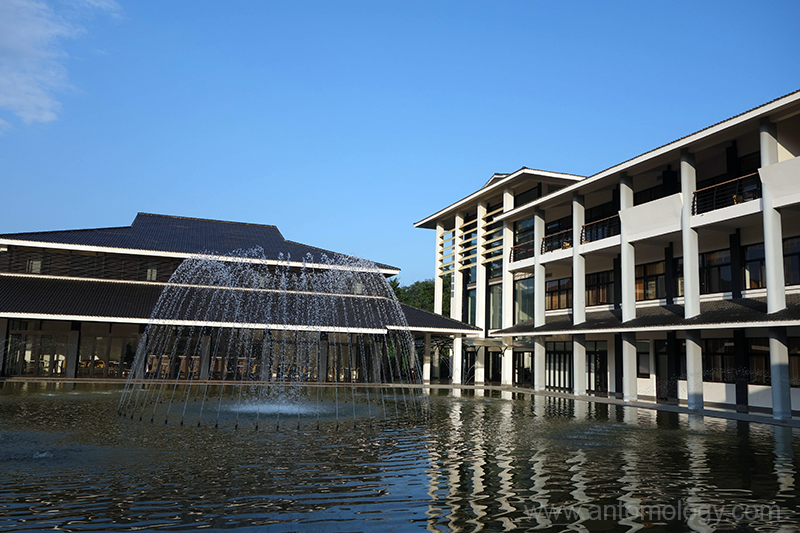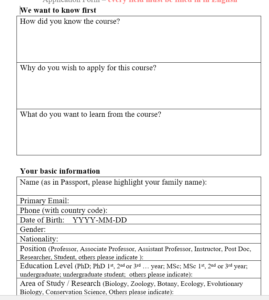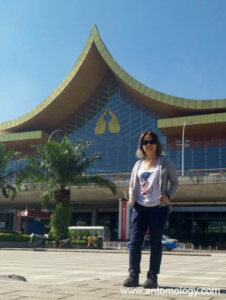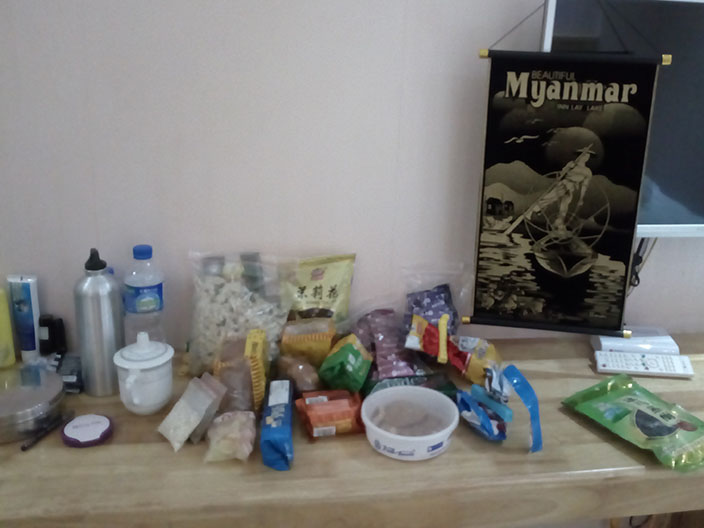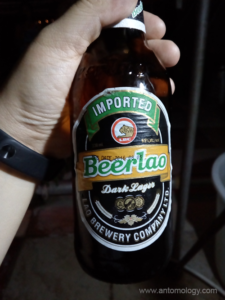| About Us |
| News |
| Announcement |
| Research |
| Conservation & Horticulture |
| Public Education |
| Graduate Study |
| Scientist |
| International Cooperation |
| Resources |
| Annual Reports |
| Publications & Papers |
| Visit XTBG |
| Societies |
| XTBG Seminar |
| Open Positions |
| 4th XSBN Symposium |
| CAS-SEABRI |
| PFS-Tropical Asia |
| Links |
| Location:Home > Visit XTBG > Information |
| The Advanced Field Course in Ecology and Conservation (AFEC-X) – My Experience (Part 1) |
|
By Introduction
The Advanced Field Course in Ecology and Conservation (AFEC) is a 6-week field course that is held at I attended this course between October 9th and November 20 in 2016, and had a great experience. You spend 6-weeks surrounded by people who are all studying ecology and conservation, and that’s all you live and breathe for those weeks. I found that the information available online regarding the course is a bit spotty, so to help people who are interested in applying I thought I’d write about my experience of the 8th annual AFEC-X. This is not so much a reflection of my time at AFEC… it’s meant to be an informative few pages regarding different aspects of the course. I have decided to split this into a two part blog post, with this part basically covering “pre-AFEC” and the second part will cover my thoughts on what happens during the course. I apologise for the lack of informative images, I didn’t realise I’d be writing a blog post about AFEC, so I didn’t take many “mundane” day-to-day photos. About the NameAFEC stands for the “Advanced Fieldcourse in Ecology and Conservation”, and the X stands for “Xishuangbanna”. There were previous AFEC courses held in other countries in other cities, so they would have been AFEC-whatever, depending on where it was held. About the LocationThe course is held at There are a variety of research groups there working on a variety of topics. There are no undergraduate students – they are all postgraduates. For more information about XTBG itself I recommend clicking on the link above. Should you even apply?Well, let me tell you about what I gained from AFEC. It’s a 6 week field course held in semi-remote research institution in China, which aims to build a whole variety of skills for early career researchers based in South East Asia. The course had about 45 students in it, and two thirds of them are students from external institutions (like me), and one third are new postgraduate students at XTBG. I made some amazing lifelong friends from all over Asia and developed great relationships with fellow researchers (I hope that we will be able to work together in the future!). It’s also a great opportunity to work with world renown scientists, and to make connections with fellow young researchers. The course is a fairly good introduction into research techniques. It’s aimed at Masters and PhD students. Personally I hadn’t started my Masters – actually I had just finished my stint of being a research assistant at the University of Hong Kong. I found all the information to be useful, but I suspect if I had done some courses at a Masters level or higher the information may not be so new – some of the lectures had content that was quite general or basic. Note that I was probably one of the youngest attendees in my year, at age 22. They had a introductory course on R and arcGIS, which were very informative (however I’m not sure how much I still remember, haha) and many many lectures on a variety of topics, ranging from climate change to drones to fossils to botany. You learn a broad variety of things but you don’t go into depth for most of it (unless you choose to pursue that topic for the independent research project). Perhaps if you are a research assistant like me and didn’t know what you wanted to pursue this would give you a good idea of what direction to go in. Some students were unhappy regarding the classes, they found that we had too many classes on boring/simple topics that weren’t relevant to what their Masters/PhD was on. 6 weeks is a decent amount of time to take off from a degree. I was between commitments so the 6 weeks was completely fine for me. For other people though – you will have to consider if you will be able to take this time off. I think if you are in the first half of your degree you will find it helpful. Otherwise the topics may be too broad and not relevant to the project in your degree and you may spend valuable thesis/fieldwork time in XTBG. I don’t think attending AFEC-X would be a waste of time for anyone, it’s a once in a lifetime opportunity, but if you are near the end of your PhD then you may be too “advanced” for the field course’s contents. Applying for AFEC-XI’m not sure when applications for AFEC open historically, but I think I submitted my application before the end of August because I had a valid Chinese visa. However, if youDO NOT I found the application process for applying to AFEC-X to be quite straight forward. There is a form for you to download and fill out. It was quite simple to complete, and while it’s format appeared quite casual, some answers (such as what your research topic is) ended up being compiled into a booklet so everyone could get to know each other – so you will want to be thorough in your answers. My answer was embarassingly brief, so I advise you fill out the form as well as you can. Scholarships XTBG has some very generous scholarships to support you if you cannot afford to pay for the course. There are 3 scholarships available, and they cover: the course fee, travel to XTBG and “substinence” (which covers the food and hotel over the period of the course). In the application form there is space to justify why you want the scholarships. Write as much relevant information as you can, I found that Don’t think you can’t attend because you can’t afford it. The scholarships are in place to help students like you. How to get to XTBGThe most common way by far is to take a plane to XTBG. Most likely you will have to fly to Kunming first, and then take a connecting flight to Jinghong – the closest airport to XTBG. XTBG will then arrange for a driver to pick you up. Most likely you will be picked up with other students who are arriving on the same flight or a flight scheduled at a similar time (I was the only AFEC-X student on my flight, so I had to wait for the next flight of students before we were all picked up by a driver). It’s also possible to get to XTBG via bus. The bus can come from Kunming or even from the Laos side. If you are up for an adventure what I would highly recommend is that you take some time off before or after the course to do some sightseeing in the region. Yunnan is a beautiful province, and Laos is very close to XTBG. It’s also quite cheap to travel around, with buses and planes that connect many different cities. Consider it! If you need help getting to XTBG contact the person in charge once you have received your acceptance email, they will be more than happy to help you out. What to BringTaking stuff for a 6 week trip can be tricky. Below are some of my thoughts regarding what to pack. If you forget to bring anything, there are supermarkets where you can get almost everything, and you can always ask a Chinese student to help you purchase something online. Remember to save some space in your luggage (or take a significant amount of snacks), because you may want to fill that space with mementos from XTBG! Clothing
The start of the course was quite warm, and I wore shorts pretty much every day. Bring mianly summer clothing, it’s actually pretty humid and hot. If you are from SE Asia you’ll know what to expect. Bring practical and breathable clothes – there will be fieldwork in the last few weeks of the course, and you will be cycling to class every day, rain or shine. Near the end I was rocking the “ecologist field outfit” most days. In the last week or so it got really chilly. There was fog in the morning – so you’ll need a sweater and decent pants, but one or two is fine. A waterproof jacket would not go amiss, XTBG does get rain and there were a few days where we had to cycle through rain to get to or from class. One of my friend bought a raincoat thing that goes over the bike and the rider, a common sight in SE Asia. The hotel has towels – so you don’t need to bring one. Food and Snacks
Bring a lot of snacks and such from home. If you have space in your luggage bring instant drinks (from powder) – they are a hit. You’ll need something to get you through each day… if you have something tasty to drink the 12-hour days will be that much more bareable. Tea or something else is just as good. The teaching room has ample hot and cold water… the course will provide some instant drinks, but they are not as tasty as ones you would bring yourself. ;D One thing I wish I’d brought was milk powder – if you want to have tea or coffee with milk every day, milk powder is the only way you’ll do it. Fresh milk is expensive in Menglun and there isn’t really a place to store it (no fridge at the hotel). Additionally, we were asked to bring some snacks from the country we came from to share with everyone. I Equipment and Tech Remember to bring converter plugs for China! Bring your laptop and your camera. A headlamp is always handy. Regarding your phone – I’m not sure how easy it is to get a short term phone card, I didn’t try. But actually most students at AFEC did not have phone cards. You don’t really need to call anyone..unless you really want to be available for people to contact via phone you don’t need to worry about a phone card. There is Wi-Fi at XTBG, and it’s fine for video calls to family and using messenger apps. There is also Wi-Fi at the hotel, it was a little bit slow and unreliable (depending on what room you were in) but since we were at XTBG every day between 9am-9pm I didn’t find this a huge issue. Pocket Money ($$$) Wondering how much money you should change into RMB? Well the town that is closest to XTBG is pretty cheap to live in. Although I have previously lived in Australia and Hong Kong, places that are infamous for their high costs of living. One bottle of Beerlao (my preferred beer! :P) will set you back around ~7 RMB at the grocery. Noodles at the breakfast place was around ~6 RMB, with an egg it was like ~8 RMB. Small buns from the bun store were 0.5 RMB each. The large was around 1 RMB, but I preferred to get many small buns rather than a few big ones. Hope that gives you an idea of how much things cost. In theory you don’t need to take any pocket money, but in practice you will want to have the occasional opportunity to eat out, buy snacks etc. Each night we went out for BBQ and drinks I think I paid somewhere between 10-25 RMB, depending on how much we ordered. I think there was an ATM in Menglun town.. you would have to double check and ask if foreign cards would be accepted. There isn’t a money changing service in Menglun, but in Jinghong there would be. In any case I would take all the money you plan on spending with you. ConclusionSo that’s the end of the first part of my discussion on AFEC. I tried to split up my parts based on a theme of what’s relevant before you go and what you experience while you’re there, but it’s hard. Do check out both parts of the review! When you get accepted into the course, you will be sent a little info package with information about how to get to XTBG, what to bring etc. This post is meant to supplement that information. Feel free to email me (via the Contact Me page) if you have any questions, always happy to answer them! Note:
|
| Appendix Download |
|
|

